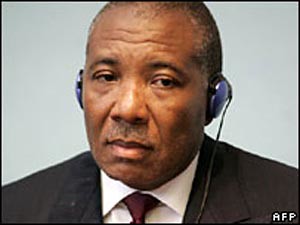
Former Liberian President Charles Taylor is on trial in the Netherlands for artrocities carried out in Sierra Leone while he was in charge in the neighboring west African nation., a photo by Pan-African News Wire File Photos on Flickr.
Taylor awaits verdict at The Hague
By Mike Pflanz
The Daily Telegraph
April 25, 2012
The special court in The Hague is expected to pronounce its verdict Thursday on Taylor, who has been on trial for more than six years on 11 counts of war crimes allegedly committed from November 1991 to January 2002, during the civil war in neighbouring Sierra Leone.
Charles Taylor, the warlord who rose to lead Liberia, could become the first ex-president to be consigned to a British prison cell after judgment is delivered in his war crimes trial Thursday.
Taylor, who ruled Liberia from 1997 until his downfall in 2003, is the first deposed head of state to face a verdict from international justice since Grand Admiral Karl Donitz, who briefly succeeded Hitler as head of the Nazi state, at the Nuremberg trials.
Taylor, the Baptist lay preacher, is accused of 11 counts of crimes against humanity and war crimes.
He allegedly armed and trained a rebel army, styling itself the Revolutionary United Front (RUF), which laid waste to neighbouring Sierra Leone during that country's civil war between 1991 and 2002. The RUF's fighters were infamous for their terror tactics, which included amputating their victims' limbs, either at the elbow - known as "short sleeves" - or at the wrist, called "long sleeves".
As many as 120,000 people died in Sierra Leone's conflict, many at the hands of children drugged on mixtures of cocaine and gunpowder poured into cuts inflicted on their arms. Taylor is accused of fuelling this war by giving the RUF guns in return for diamonds during his time as Liberia's leader.
His aides allegedly passed on a pouch of these diamonds to Naomi Campbell after a dinner hosted by Nelson Mandela, then South Africa's president, according to the supermodel's testimony. Miss Campbell told the court that Taylor's aides had given her what looked like "dirty stones".
Nine years after he was first indicted by a United Nations Special Court - and six years after being arrested in Nigeria, where he was living in exile - four judges will deliver their verdict in The Hague today.
"There really has never been anything like this: it is a landmark," said Patrick Alley, director of Global Witness, a British charity focused on the link between human rights abuses and the exploitation of natural resources.
"If he is convicted, it sends a very clear message that anyone who thinks they can carry out activities that lead to crimes against humanity - or who try to loot state resources to carry out abuses - can no longer do so with impunity."
If Taylor is convicted, Britain has offered to hold him in a high security prison. No jail in West Africa is considered secure enough to keep him behind bars.
In Sierra Leone's capital, Freetown, few people will be able to watch today's proceedings over the Internet.
But many will take a great interest in the verdict, said Henry Sheku, of the Human Rights Commission of Sierra Leone. "It's in the papers, it's on the radio, it is the thing that people are talking about," he said.
"There is a strong feeling that this is the time for justice finally to prevail, which is something that especially those most harmed by the evil that he brought to our country have been waiting for too long."
On January 6 1999, the RUF attacked Freetown - allegedly with Taylor's help - and inflicted terrible bloodshed on the city. The people of Sierra Leone will be watching to see whether the man accused of being an architect of that traumatic event, popularly known as "January 6", will face punishment.
Taylor, 64, invaded Liberia as the head of a guerrilla army on Christmas Eve 1989, waging a brutal war before winning a presidential election in 1997. He won that poll with the unusual slogan: "He killed my Ma, he killed my Pa, he gets my vote". For a short time, this election victory gave Taylor a veneer of respectability, allowing him to attend dinner parties with the likes of Mr Mandela.
However, Liberians remembered that he openly recruited child soldiers during their civil war, even forming a specialist "Small Boys Unit".
Taylor's rule was so corrupt and brutal that another rebel alliance emerged dedicated to his overthrow.
In 2003, they attacked the capital, Monrovia, forcing him to flee into exile in Nigeria. He lived under the shadow of his indictment until Nigeria handed him over for trial in 2006.
Witnesses have testified about radio exchanges between Mr Taylor and the RUF, while weapons were allegedly smuggled into Sierra Leone in sacks of rice, paid for with diamonds sent over the border to Liberia in a mayonnaise jar.
Taylor has called the charges "diabolical lies".
No comments:
Post a Comment